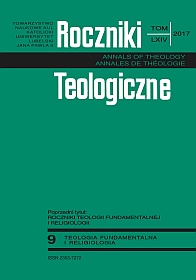Islam and Christianity in Northern Cameroon - from Confrontation to Difficult Dialogue
Abstract
The earliest inroads of Islam on the northern edges of today's Cameroon came from northern Africa. They led all the way from Arabian Egypt and Libya still in the times of the Berbers. Early islamification yielded Moslem states, created mainly in the area of Lake Chad. This first onset was connected primarily with acquiring slaves and new subjects. The next inroad of Islamic infiltration came from Fulani infiltration of territory in northern Cameroon, beginning in the 17th and 18th centuries. In the 19th century the Fulani conquered northern Cameroon, although numerous enclaves of the Kirdi peoples evaded their authority. The Fulani achieved much greater mastery over the Kirdi during the time of French and German rule. They took advantage of their dominant political position and of their cooperation with the colonizers. In this way they brought about the greater islamification of these lands, but they did not win the majority of the population to their religion. In the mid-20th century Catholic and also Protestant missionary activity began a robust development in Kirdi territory. Their activity was restrained by the Fulani leaders. Additionally, favoritism of the Fulani and Islam in northern Cameroon continued after Cameroon gained independence in 1982. The intense rivalry began, however, to give place to a more peaceful coexistence, and even cooperation in many areas of social life. The time had arrived for a difficult dialogue, a dialogue which continually struggles with the past, with prejudice, and with a lack of understanding among many religious and political leaders.
References
Adama H., L'islam au Cameroun. Entre tradition et modernité, L'Harmattan, Paris 2004.
Aurenche Ch., Vulliez H., Tokombéré, au pays des Grands Prêtres. Religions africaines et Évangile peuvent-ils inventer l'avenir?, Éd. de l'Atelier, Paris 1996.
Baskouda Shelley J.B., Kirdi est mon nom, Yaoundé 1993.
Bayart J.F., L'Etat au Cameroun, Presses de la Fondation nationale des sciences politiques, Paris 1979.
Boko Haram: Islamism, politics, security and the state in Nigeria, red. M.A. Perousé de Montclos, African Studies Centre/ Institut Français de Recherche en Afrique, Leiden 2014.
Briggs E.T., The protestant Church in the Cameroon. The early days – 1841 to 1887, w: E. Mveng, Histoire des Églises chrétiennes au Cameroun: les origines, CLE, Yaoundé 1990, s. 5-53.
Cuoq J.M., Les musulmans en Afrique, Maisonneuve et Larose, Paris 1975.
Karpiński R., Sudan Centralny do końca XVI w., w: Historia Afryki do początku XIX w., red. M. Tymowski, Zakład Narodowy Imienia Ossolińskich, Wrocław−Warszawa−Kraków 1996, s. 498-544.
Kurek A., Stefan Szolc-Rogoziński, świecki inicjator działalności misyjnej, „Collectanea Theologica” 1978, fasc. 1, s. 165-171.
Lacroix P.F., Le puel, w: Les langues dans le monde ancien et moderne, t. 1, red. J. Perrot, Éditions du Centre national de la recherche scientifique, Paris 1981, s. 19-31.
Lebeuf M.D., Les principautés Kotoko. Essai sur le caractère sacré de l'autorité, C.N.R.S., Paris 1969.
Lestringant J., Le pays de Guider au Cameroun. Essai d'histoire régionale, Versailles 1964.
Mohammadou E., Ray ou Rey Bouba. Traditions historiques des Foulbé de l'Adamâwa, C.N.R.S., Paris 1979.
Piłaszewicz S., Ferment w życiu religijnym Nigerii. Ruch Boko Haram, „Afryka” 2012, z. 35, s. 27-40.
Piłaszewicz S., Odrodzenie i radykalizacja sekty Boko Haram, „Afryka” 2012, z. 36, s. 11-23.
Piłaszewicz S., Potęga Księgi i Miecza Prawdy. Religia, cywilizacja i kultura islamu w Afryce Zachodniej, Wydawnictwo Naukowe PWN, Warszawa 1994.
Różański J., Działalność polskich oblatów Maryi Niepokalanej w Kamerunie (1970-2010), Wydawnictwo Uniwersytetu Kardynała Stefana Wyszyńskiego, Warszawa 2015.
Schilder K., État et islamisation au Nord Cameroun (1960-1982), „Politique africaine” 1991, nr 41, s. 144-148.
Segué A., L'Eglise et l'état au Cameroun (1890-1972). De l'affrontement au „dialogue”. Thèse de doctorat de troisieme cycle, Strasbourg 1983 (mps).
Urvoy Y., Chronologie du Bornou, „Journal de la Société des Africanistes” 11(1941), nr 1-2, s. 21-32.
Urvoy Y., Histoire de l'empire du Bornou, Librairie Larose, Paris 1949.
Zielenda K., Państwo w państwie. W obronie mieszkańców lamidatu Rey Bouba, „Misyjne Drogi” 1995, nr 5, s. 16-19.
Copyright (c) 2017 Roczniki Teologiczne

This work is licensed under a Creative Commons Attribution-NonCommercial-NoDerivatives 4.0 International License.





